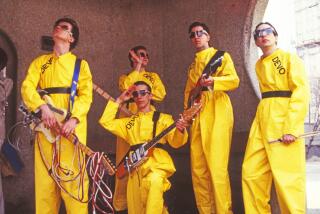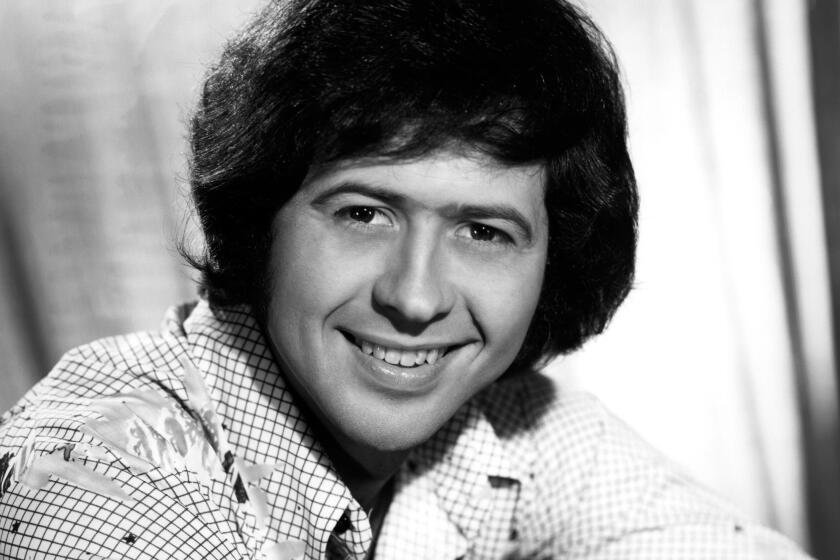POP MUSIC REVIEW : Hoodoo Gurus: No Hocus-Pocus : A Lot of Posturing as Australian Rockers Show Anything But Magic
SAN JUAN CAPISTRANO — From a band called the Hoodoo Gurus, one would expect spells and intoxicating potions.
These veteran Australian guitar rockers have shown themselves capable of delivering an alluring pharmacopoeia in the past, but they conjured little magic Tuesday night at the Coach House. Instead, the Gurus offered 85 minutes of yeomanly pop-rock, showcasing some obvious virtues, but seldom igniting a special spark.
Melody is a Hoodoo Gurus strength, and at least half of the set’s 21 songs featured memorable, hummable hooks. Singer-guitarist Dave Faulkner’s nasal, sandpapery voice isn’t going to land him in the pure-pop hall of fame. Still, he has a decent range and the Hoodoo Gurus know the value of rounding out his gritty lead voice with sweeter harmonies--consistently well-sung by Brad Shepherd, the lead guitarist.
Brawn wasn’t lacking, either, thanks to drummer Mark Kingsmill’s muscular thwack, and to a healthy interest in psychedelic guitar distortion and garage-rock slashing and grinding on Shepherd’s part.
But the sense of joyful lift and transporting intensity that a good melodic rock band creates when it is clicking failed to materialize.
The Gurus seemed stalled by an inability to cut through their own contradictions. On some songs, Faulkner took reflective looks into the state of his own psyche, while on others, the only purpose was to blaze away and have a good time with rockers glazed with a bit of humor.
Changing moods and contrasting facets are admirable, but as the Hoodoo Gurus launched its set, the band seemed to have no plan for establishing either emotional intensity or a motivating groove. Instead, the quartet herked and jerked, failing to set a mood or gather momentum as it alternated heavy rockers with lighter, jangling elegiac songs.
Instead of following a plan, Faulkner started taking requests almost from the start. Like many a rock band used to playing for stand-up crowds, the Gurus seemed uncomfortable with the Coach House’s sit-down, dinner-house setup. Taking requests early on may have been Faulkner’s way of establishing a connection with an audience that the band feared would remain inert and remote.
Looking like a skinny version of Phil Collins, Faulkner was too reserved to be an engaging presence, although there was some dry humor in his terse song introductions and asides. Whatever his virtues as a vocalist, he didn’t measure up as a musical storyteller. Numbers such as the mock-spooky “Dig It Up,” “I Was a Kamikaze Pilot” and “Leilani,” an oddity about a pagan sacrifice, could have used some role-playing to illustrate the action. It wasn’t forthcoming.
The Hoodoo Gurus did connect on a couple of edgier songs of self-reproach. “I Don’t Know Anything” stormed hard to an ending in which guitar chords flew like pieces of shattering windshield glass. The introspective “1000 Miles Away” was the show’s highlight. Faulkner established direct emotional contact during a quietly strummed intro, then the song built to a firm rocker without losing its plaintive cast. The Hoodoo Gurus didn’t play “I Was the One,” a song with similar qualities of rocking force and swelling, rueful pop splendor.
Among the rocking-for-the-fun-of-it numbers, the psychedelic “Miss Freelove ‘69,” “Axegrinder,” a boastful number with vocals that followed a military drill cadence, and a ‘60s-vintage Australian surf-party song, “Stomp the Tumbarumba” were all effective.
The band finished well with “Like Wow-Wipeout” a mixture of ‘60s trash-pop and ‘70s punk that sounded like the Clash having a go at the Tommy James & the Shondells oldie, “Mony Mony.” Faulkner ended it with a piercing yowl, but then walked off stage as self-contained as an office worker checking out at 5 p.m. If a band like the Hoodoo Gurus is doing its job, everybody leaves sweaty and exuberant, and there is no hint of the workaday about it.
More to Read
The biggest entertainment stories
Get our big stories about Hollywood, film, television, music, arts, culture and more right in your inbox as soon as they publish.
You may occasionally receive promotional content from the Los Angeles Times.








